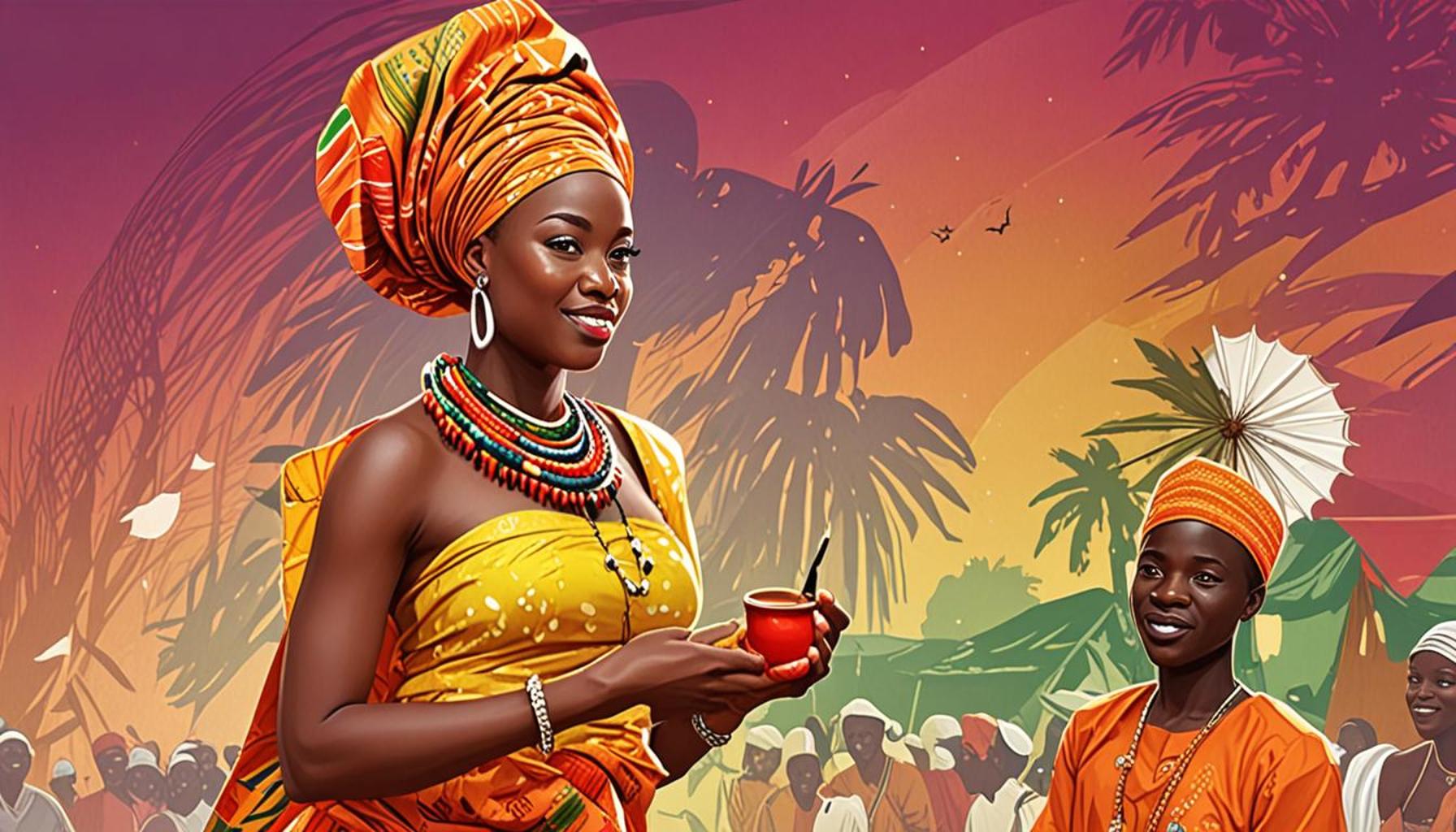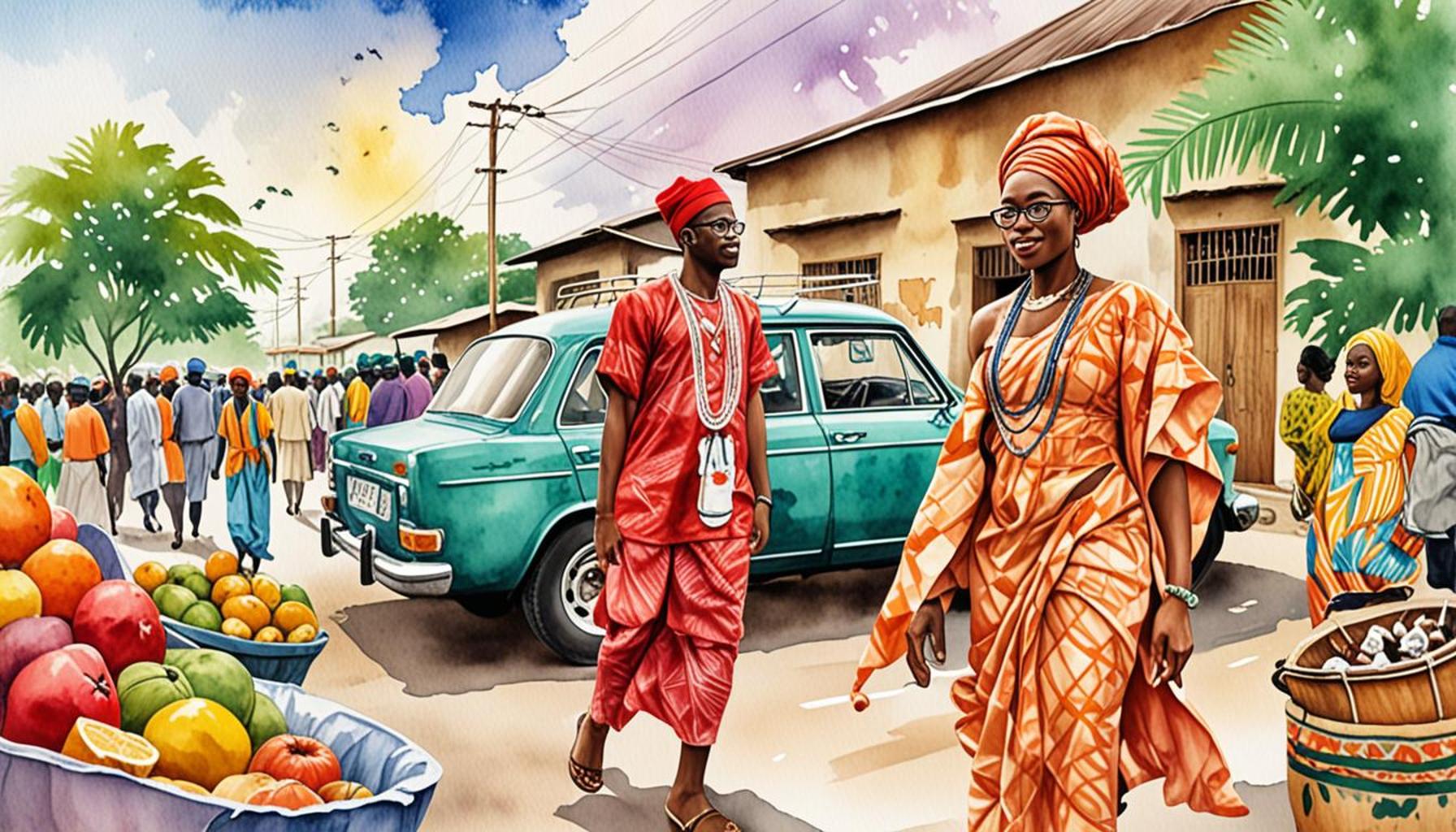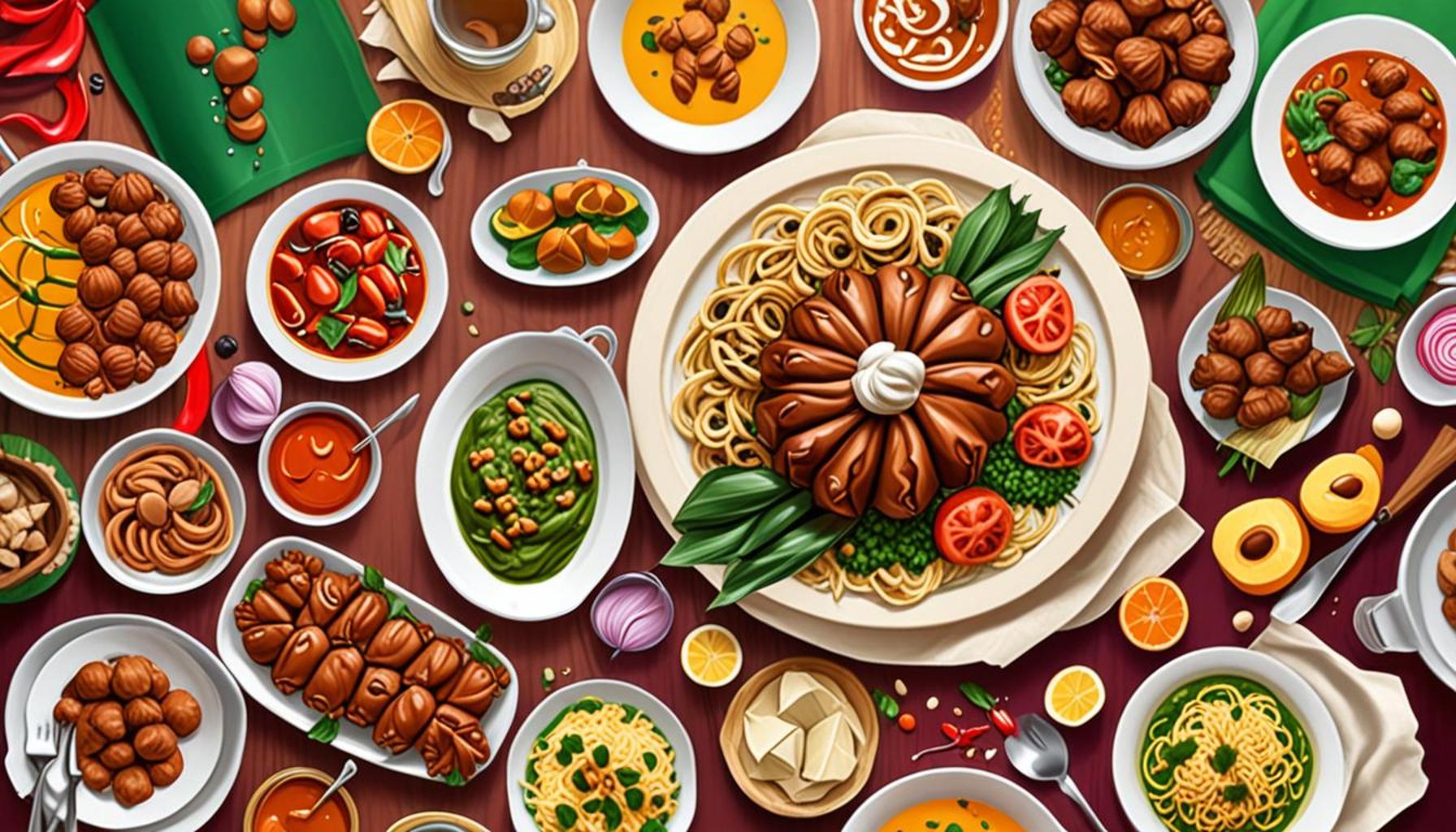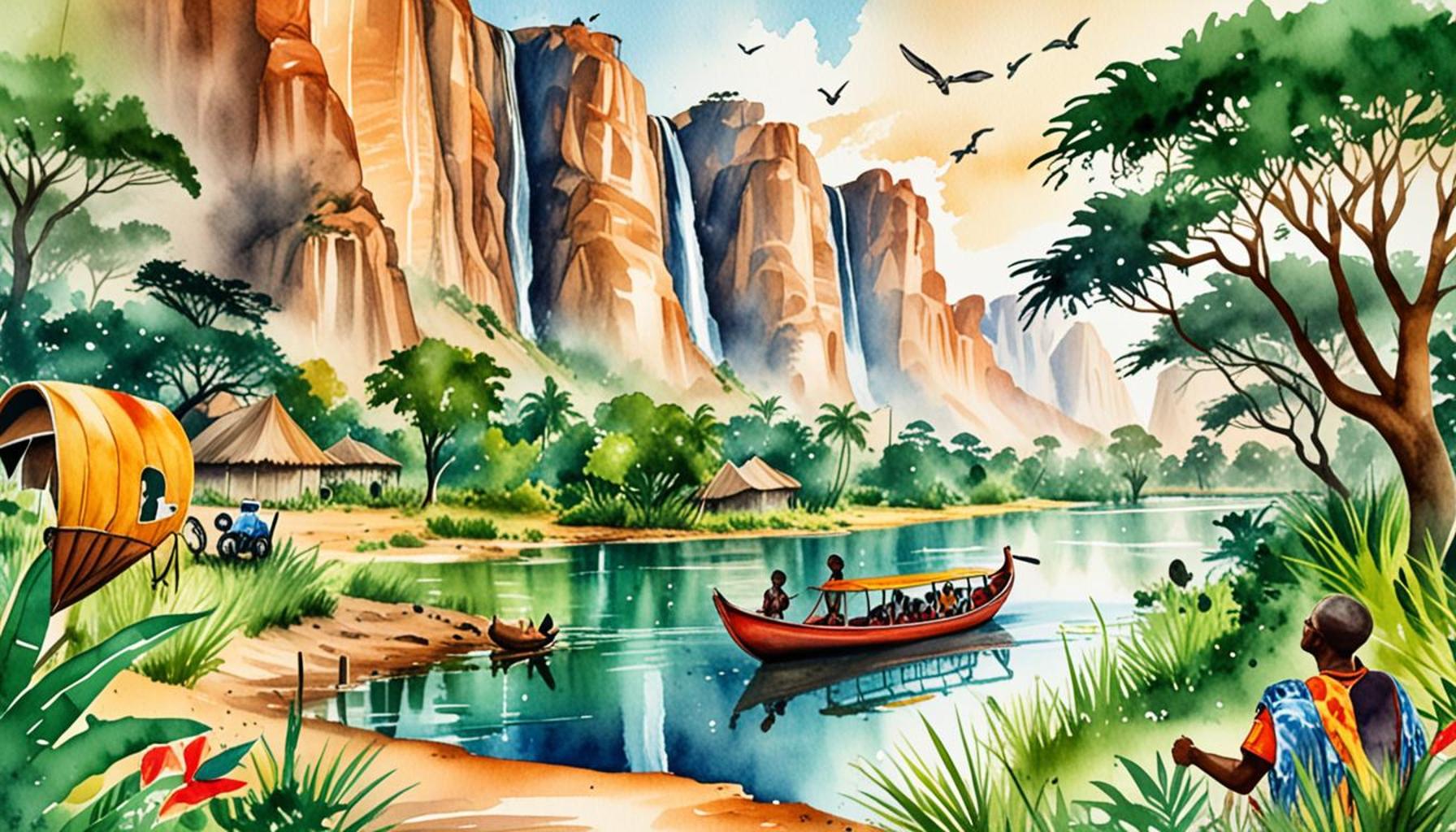Cultural Festivals of Nigeria: Itineraries to Experience Joy and Tradition

Exploring the Richness and Diversity of Nigerian Cultural Festivals
Nigeria is a country characterized by its rich cultural heritage, shaped by numerous ethnic groups and their age-old traditions. These cultural festivals are not merely celebratory events; they represent the very essence of Nigeria’s identity, showcasing its joy, history, and communal spirit. Each festival provides a unique glimpse into the customs, beliefs, and narratives that define the lives of the Nigerian people.
Key Features of Nigerian Festivals
- Vivid Displays: Festivals in Nigeria are renowned for their spectacular displays. Expect a riot of colors in the form of intricate costumes adorned with beads, feathers, and other traditional embellishments. Traditional music pulsates through the air, from drums to flutes, creating a lively atmosphere that invites both locals and tourists to dance along.
- Local Cuisine: Culinary experiences take center stage at these festivals. Each community showcases its signature dishes, allowing visitors to savor local delicacies like jollof rice, suya, and pounded yam alongside a variety of soups that reflect regional flavors. Tasting these dishes is an essential component of the festival experience.
- Cultural Significance: Every festival encapsulates a rich tapestry of stories, celebrating everything from agricultural cycles to historical events. For instance, the Osun-Osogbo Festival serves as a spiritual pilgrimage to honor the goddess Osun, while the Durbar Festival commemorates the end of Ramadan, highlighting the deep-rooted Islamic traditions in Northern Nigeria.
Among the myriad of festivals, the Calabar Carnival stands out with its vibrant street parades, showcasing cultural diversity and creativity through costumes and performances. The carnival, celebrated in December, draws thousands of participants and spectators alike, all eager to witness the colorful expressions of art and culture.
Popular Festivals to Experience
- Eyo Festival: Predominantly celebrated in Lagos, the Eyo Festival is a grand homage to the departed Oba (king) of Lagos. The festival features men dressed in white, called Eyo, who process through the streets to celebrate the life and contributions of the deceased ruler.
- Durbar Festival: This festival showcases a magnificent horse parade filled with color and pageantry. The Durbar Festival is celebrated after Ramadan and is primarily associated with the Fulani and Hausa cultures, featuring horsemen displaying their equestrian skills while adorned in beautiful traditional attire.
- Gerewol Festival: This captivating festival is marked by colorful courtship rituals among the Wodaabe people of Northern Nigeria. Men adorn themselves with elaborate face paint and costumes, engaging in dance competitions to woo potential brides—a fascinating representation of beauty and cultural expression.
As you contemplate experiencing these magnificent festivals, you’ll find that they offer a wealth of opportunities not only to celebrate cultural heritage but also to connect with locals and immerse yourself in the vibrant traditions of Nigeria. Our guide promises essential itineraries that will enrich your adventure, ensuring that you explore thejoy, tradition, and cultural enlightenment these festivals have to offer. Whether you’re a seasoned traveler or a curious explorer, these cultural celebrations present an unforgettable journey into the heart of Nigeria.
RECOMMENDED: Check out this similar article
Entering the Heart of Nigeria’s Cultural Festivals
As you embark on a journey through Nigeria’s cultural festivals, you will quickly discover that each occasion tells a story, reverberating with the values and historical narratives of different communities. These celebrations are not only opportunities to showcase local customs but also vital moments that reinforce social bonds, honor ancestors, and bring together people from various walks of life. From the bustling streets of Lagos to the serene landscapes of the North, the diverse tapestry of Nigerian culture unfolds dramatically during these events.
Experiencing the Eyo Festival: A Spiritual Journey
The Eyo Festival is perhaps one of Lagos’ most iconic cultural spectacles. Celebrated in honor of past kings, the festival features participants dressed entirely in white, signifying purity and remembrance. As the Eyo follow the route through the city, they are accompanied by traditional drumming and chanting, creating an atmosphere that resonates deeply with spirituality and reflection. This festival serves as a poignant reminder of the city’s history, drawing locals and tourists alike who wish to witness the grandeur of the Lagos kingdom’s past.
The Majesty of the Durbar Festival
Further north lies the Durbar Festival, a striking celebration following the month of Ramadan. This festival is renowned for its breathtaking parades, showcasing majestic horses, adorned riders, and elaborate costumes—elements that encapsulate the rich Islamic heritage of the Hausa and Fulani communities. The festival is not just a visual feast; it is also a display of equestrian artistry where horsemen demonstrate their skills and strength, symbolizing power and prestige. Seeing the parade in cities like Kano or Katsina is an experience that leaves many enchanted, as the vibrant colors and rhythmic sounds transport participants back to a time of royal grandeur.
Captivating Courtship at the Gerewol Festival
Among the lesser-known yet equally fascinating events is the Gerewol Festival of the Wodaabe people. This festival stands out for its unique emphasis on beauty and romance. Men and women participate in a courtship ritual that involves elaborate dress, intricate face painting, and captivating dance competitions. As the men perform to attract potential brides, they engage in a display of talents, showcasing their cultural pride and artistic skills. The Gerewol offers an immersive experience into the traditions of the Wodaabe, reflecting the softer, yet equally robust aspects of Nigerian culture.
Why You Should Immerse in These Festivals
The cultural festivals of Nigeria present an incredible opportunity for both locals and visitors to engage with the country’s history and its people. Each festival provides a snapshot of the values, beliefs, and communal spirit that define the various ethnic groups across the nation. For anyone looking to experience Nigeria beyond its borders, these occasions are not just events but profound journeys into the heart of what makes this nation truly remarkable.
As you delve deeper into Nigeria’s vibrant festival scene, it becomes evident that each itinerary crafted around these events promises not just an atmospheric celebration but a deep sense of connection to the history, joy, and resilience of the Nigerian spirit. Whether you’re savoring local dishes, participating in traditional dances, or simply engaging with the locals, these experiences will surely stay etched in your memory. Discover the joy, tradition, and cultural enlightenment that await you in the festivities of Nigeria. The journey is just beginning.
Cultural Festivals of Nigeria: Itineraries to Experience Joy and Tradition
Nigeria is home to a vibrant tapestry of cultural festivals that reflect the country’s diverse ethnic heritage and enriching traditions. Each festival offers visitors an unparalleled opportunity to immerse themselves in local customs, music, dance, and culinary delights.
| Advantages | Experiencing Culture |
|---|---|
| Rich Cultural Heritage | Festivals showcase traditional practices, storytelling, and communal values. |
| Economic Growth | These events significantly boost local tourism and support small businesses. |
One of the most fascinating aspects of Nigerian cultural festivals is the storytelling that accompanies traditional performances. For instance, the Durbar Festival in Kano is not just a parade of beautiful horses and riders but also a platform for sharing historical narratives and the art of craftsmanship.Visitors can relish the *Orompada* Festival, where the vibrant costumes and celebratory dance styles leave an indelible impression. The food during these events is equally significant, as local dishes represent the heritage of the area and offer tourists a taste of Nigerian hospitality.Moreover, festivals such as the Ijaw Day celebrate the cultural identity of the Ijaw ethnic group, drawing attention to environmental issues while promoting unity among the community. Each festival provides a distinctively engaging experience, encouraging an exploration of Nigeria’s multi-faceted identity. Make sure to participate in these festivities, not only to witness the grandeur but to witness the deep-rooted traditions that are celebrated with fervor, ensuring that every moment is bursting with joy and rich cultural insights.
SEE ALSO: Click here to read another article
Diving Deeper into Nigeria’s Festive Celebrations
Each region of Nigeria boasts its own unique cultural identity, and the festivals that emerge from these identities provide invaluable insight into the country’s diverse heritage. Intertwining its entire cultural fabric, festivals in Nigeria offer an experience that transcends mere celebration; they become a conduit for storytelling, artistry, and community solidarity. As you map out your itineraries, consider immersing yourself in these remarkable events that echo the heartbeat of Nigeria.
The Rich Tapestry of the Osun-Osogbo Festival
The Osun-Osogbo Festival stands as a testament to the Yoruba people’s connection to nature and spirituality. This festival takes place annually in Osogbo, the capital of Osun State. Pilgrims and tourists converge to honor the Osun River goddess, celebrated for her role in the fertility of the land. Participants engage in rituals that promote harmony between humanity and nature, culminating in a vibrant procession led by the Arugba (the ritual calabash carrier). The visually striking event, infused with vibrant costumes and rich sounds, is a celebration of culture and a pilgrimage where tradition and modernity coexist. Exploring the festival allows visitors to revel in serene beauty while discovering the profound roots of Yoruba cosmology.
The Colorful Vibrance of the Calabar Carnival
Often referred to as Africa’s biggest street party, the Calabar Carnival infuses Ekpo and Efik tradition with contemporary artistic expression. This festival, which takes place in December, features breathtaking floats, colorful masquerades, and dazzling costumes that represent various cultural groups. Visitors can expect a cacophony of music, dance, and performance art that celebrates the rich history of Cross River State. The carnival not only showcases Nigeria’s artistic prowess but also brings together people from different backgrounds, providing a platform for cultural exchange. Here, every participant, irrespective of their origin, contributes to the vibrant tapestry of Nigerian identity.
Celebrating Resilience at the New Yam Festival
The New Yam Festival, celebrated predominantly by the Igbo people, marks the end of the harvest season and the beginning of a new one. Usually held in August, this festival holds deep cultural significance, symbolizing gratitude for bountiful yields. Traditional dancers don their best attire, and communal feasting takes center stage, with yams taking pride of place in the banquet. The festival serves as an essential rite of passage, fostering unity among families and friends. As you partake in the festivities, the gastronomic delights alongside the rhythmic movements of dance and music provide a kaleidoscopic experience unlike any other.
Why These Festivals Matter
Engaging in Nigeria’s cultural festivals opens a doorway to understanding the complexities of its society, where tradition and modernity intertwine seamlessly. Each festival not only entertains but educates participants about historical events, local legends, and community values that have shaped Nigeria’s cultural landscape. For those seeking to truly experience Nigeria, these festivals impart invaluable lessons about resilience, creativity, and unity.
As you chart your journey through these remarkable events, you will realize that each festival offers a unique venture into the soul of Nigeria, illuminating the joys and traditions that bind its people together. Every celebration promises to enrich your understanding of Nigeria’s cultural heritage, leaving you with stories and memories that resonate long after the festivities have concluded.
YOU MAY ALSO LIKE: Read read another article
Embracing the Essence of Nigeria’s Cultural Festivals
As we draw the curtain on our exploration of Cultural Festivals of Nigeria, it becomes evident that these vibrant celebrations are far more than just events marked in calendars; they are profound expressions of the nation’s heritage and collective identity. Engaging in these festivals offers a unique opportunity to delve into the stories, rituals, and artistic expressions that have been passed down through generations. Whether you find yourself amidst the Osun-Osogbo Festival, the breathtaking Calabar Carnival, or the heartfelt New Yam Festival, each moment spent in celebration resonates with the rich tapestry of Nigeria’s diverse communities.
The itineraries crafted around these events not only provide a chance to witness spectacular performances and taste delicious local cuisines but also impart vital insights into the values that shape Nigerian society. From the themes of reverence for nature to the acknowledgment of seasonal cycles and communal bonding, every festival serves as a poignant reminder of Nigeria’s cultural resilience and unity. Thus, as you plan your journey, consider embracing the warmth and joy that each festival brings, for they illuminate the essence of what it means to be a part of this beautiful mosaic of cultures.
Ultimately, participating in Nigeria’s cultural festivals is an invitation to celebrate the spirit of togetherness, allowing visitors and locals alike to foster a deeper understanding and appreciation of what binds people together across this magnificent land. With each festival providing a unique calendar experience, immerse yourself in the joy, tradition, and vibrancy that define Nigeria—your heart will resonate with its stories long after the celebrations have concluded.


